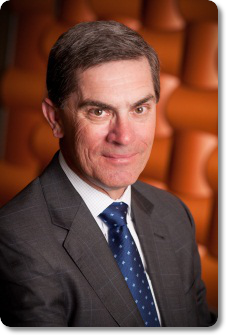 What is the most valuable project, program or innovation your IT organization has delivered in the last 12 months?
What is the most valuable project, program or innovation your IT organization has delivered in the last 12 months?
We have totally restructured the CIO shop so that almost all of the day-to-day IT operations reside in our IT services organization. This has allowed us to leverage our investments in internal IT and sell those services to our external customers. For example, prior to the reorganization, our Network Operations Center (NOC) was totally focused on managing our corporate networks. Today, we support both internal and external customer networks from that same NOC. Previously, when we acquired a new customer we would need to build a NOC for them, equip it, staff it, and train people before going operational. Now, on the first day of customer engagement, we already have a trained NOC staff that is ready to go.
The strategy behind this change was to focus the CIO organization less on operations and more on innovation and business growth. If the CIO team is totally focused on daily operational issues, we can’t focus on the larger and longer term strategies and challenges.
This change has been very good for the career opportunities of our operations staff. Before, if you were an IT person working on corporate systems, what was your career path? Where could you go? Now, our technical staff can work on a customer site, then come back into the IT shop, or go out and run a P&L. We have diversified our IT roles so that our future CIOs will have both technical and P&L experience.
Does your IT organization have a motto or mantra?
No! My bias against mottos comes from both my time in the Department of Defense and the industry. My experience has been when mottos lead to coffee cups and t-shirts – the program is doomed.
"In the last 12 months, our IT staff has helped with more than $2B worth of proposals. Before we made the change in our organization, that number was zero." |
What is one IT word your business partners would like never to hear again?
The word “No.”
What is an interview question you ask candidates you are considering for senior IT positions?
I am looking for their ability to think, so I ask them some non-traditional questions. I give them a problem statement and ask how they would solve it. For example, “Let’s say we have a brand new CEO, and you’re Wintel shop, and he’s an Apple guy. What do you tell him?” I’m looking for someone who doesn’t give me the pat response of “I would go talk to him and explain to him why we can’t support Apple.” I’m looking for someone who can think more broadly, and suggest that perhaps we should consider multiple architectures to support how businesses work today.
What book has had a major impact on your leadership style?
 There are two great books that are easy reads: Once an Eagle, by Anton Myrer, and The Killer Angels, by Michael Shaara. Both books look at contrasting leadership styles and the impact on those being led. Then there is the textbook, Power in Organizations, by Jeffrey Pfeffer, out of Stanford University that examines how power is used. Also, while it’s not a book, try watching Twelve O'Clock High (1949, starrring Gregory Peck) the next time you have two hours on a flight. You’ll see a leader fall into the trap of identifying too closely with his team and not being objective enough to make the right decisions.
There are two great books that are easy reads: Once an Eagle, by Anton Myrer, and The Killer Angels, by Michael Shaara. Both books look at contrasting leadership styles and the impact on those being led. Then there is the textbook, Power in Organizations, by Jeffrey Pfeffer, out of Stanford University that examines how power is used. Also, while it’s not a book, try watching Twelve O'Clock High (1949, starrring Gregory Peck) the next time you have two hours on a flight. You’ll see a leader fall into the trap of identifying too closely with his team and not being objective enough to make the right decisions.
What technology innovations or business trends are you most excited about?
For me, what’s most exciting is the ability to link mobility and cloud, which, when combined, offer the greatest potential for changing how we work today. If you look at most companies, some are very innovative, but the others are still stuck in an industrial factory-driven world. When you combine mobility with cloud, you get the opportunity to change foundational issues, like how we all do our work. I was overjoyed when I saw that a senator is re-examining some laws, created in 1938, that define exempt and non-exempt status. In a world of mobility and cloud, we can’t work like we are still in the 1930s. Why do I have to be in the office Monday through Friday? Our technology allows people to do work anytime, anywhere.
The CIO Paradox is a set of contradictions (IT “and” the business, for example) that prevents CIOs from delivering maximum business value. Why do you think the CIO Paradox exists?
Traditionally, most CIOs have risen out of the technical ranks. I have witnessed technical CIOs and business leaders talking past one another. As a result, the CIO is perceived as not understanding the business problem. Likewise, the business leader often does not see the complexity of their request. As more CIOs have P&L experience, I expect the situation will improve.
How does the CIO Paradox manifest in your organization?
Last quarter, one of our group presidents had to ship millions of dollars of product quickly in order to make his quarter. He said, “I can’t have our systems hiccup at all this week.” He quickly recognized how important IT is and that he can’t run his factory without software. The paradox is: Business leaders don’t understand the importance of software, and they can’t run the company without it.
How have you “broken the Paradox”?
I would say for us it is a work-in-progress, but we know we are delivering real value when we get called to work on a business problem as opposed to, “The email is down; can you fix it?” We just won a contract to assist the Census Bureau with their mobility strategy. The individuals who helped the business write the proposal were out of the CIO shop. Our business customer said, “Your people are smart and have the technical wherewithal to help us with our business problems.“ In the last 12 months, our IT staff has helped with more than $2B worth of proposals. Before we made the change in our organization, that number was zero.
About Ted Hengst
Ted Hengst is corporate vice president and chief information officer (CIO) of Harris Corporation. He is responsible for setting the strategic direction, architecture, and governance of the company’s global IT enterprise to drive innovation, fuel growth, enable change, and create a competitive advantage through the use of information technology. Most recently, Mr. Hengst served as president of Harris IT Services.
Mr. Hengst earned a bachelor of science degree in engineering from the U.S. Military Academy at West Point and a master of science degree in management information systems from the Naval Postgraduate School in Monterey, California.
About Harris Corporation
Harris is an international communications and information technology company serving government and commercial markets in more than 150 countries. Harris is dedicated to developing best-in-class assured communications® products, systems and services.

Written by Martha Heller
Martha Heller is CEO of Heller and author of Be the Business: CIOs in the New Era of IT, and The CIO Paradox: Battling the Contradictions of IT Leadership.



